Business Communication: Negotiation Approaches for United Beverages
VerifiedAdded on 2021/02/19
|9
|2518
|26
Report
AI Summary
This report examines business communication and negotiation approaches within the context of United Beverages Pty. Ltd. It begins with an introduction to business communication, emphasizing its role in organizational success and the importance of negotiation skills. The main body analyzes two primary negotiation approaches: competitive positional-based negotiation and problem-solving interest-based negotiation, detailing their characteristics, assumptions, and associated risks. The report then explores the influence of these approaches on business relationships and provides a comparison between them. Ultimately, the report recommends the problem-solving interest-based negotiation approach for United Beverages, highlighting its potential to foster teamwork, collaboration, and improved vendor relations, leading to a more competitive position in the market. The conclusion reinforces the significance of effective business communication and negotiation skills for achieving organizational goals and sustainable profitability.
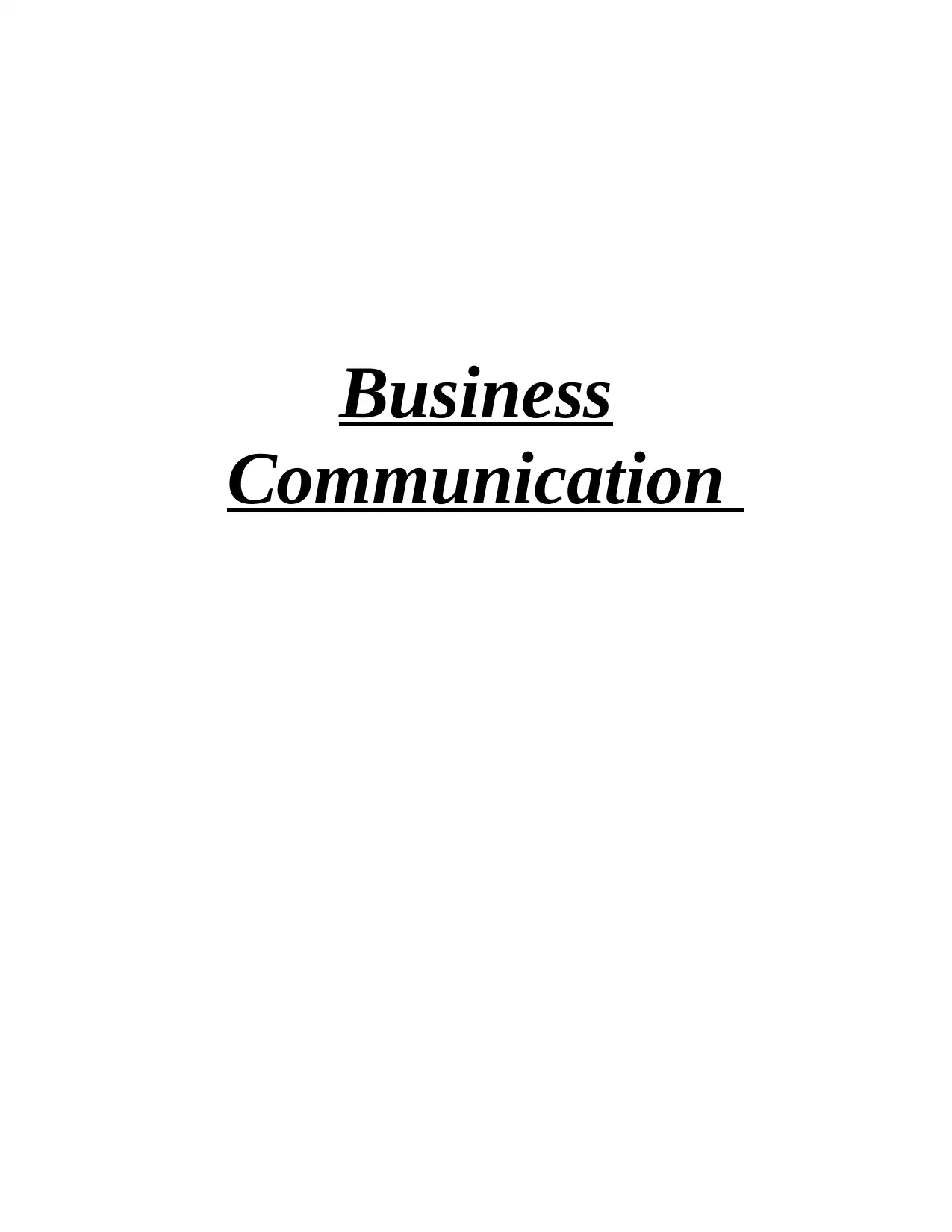
Business
Communication
Communication
Paraphrase This Document
Need a fresh take? Get an instant paraphrase of this document with our AI Paraphraser
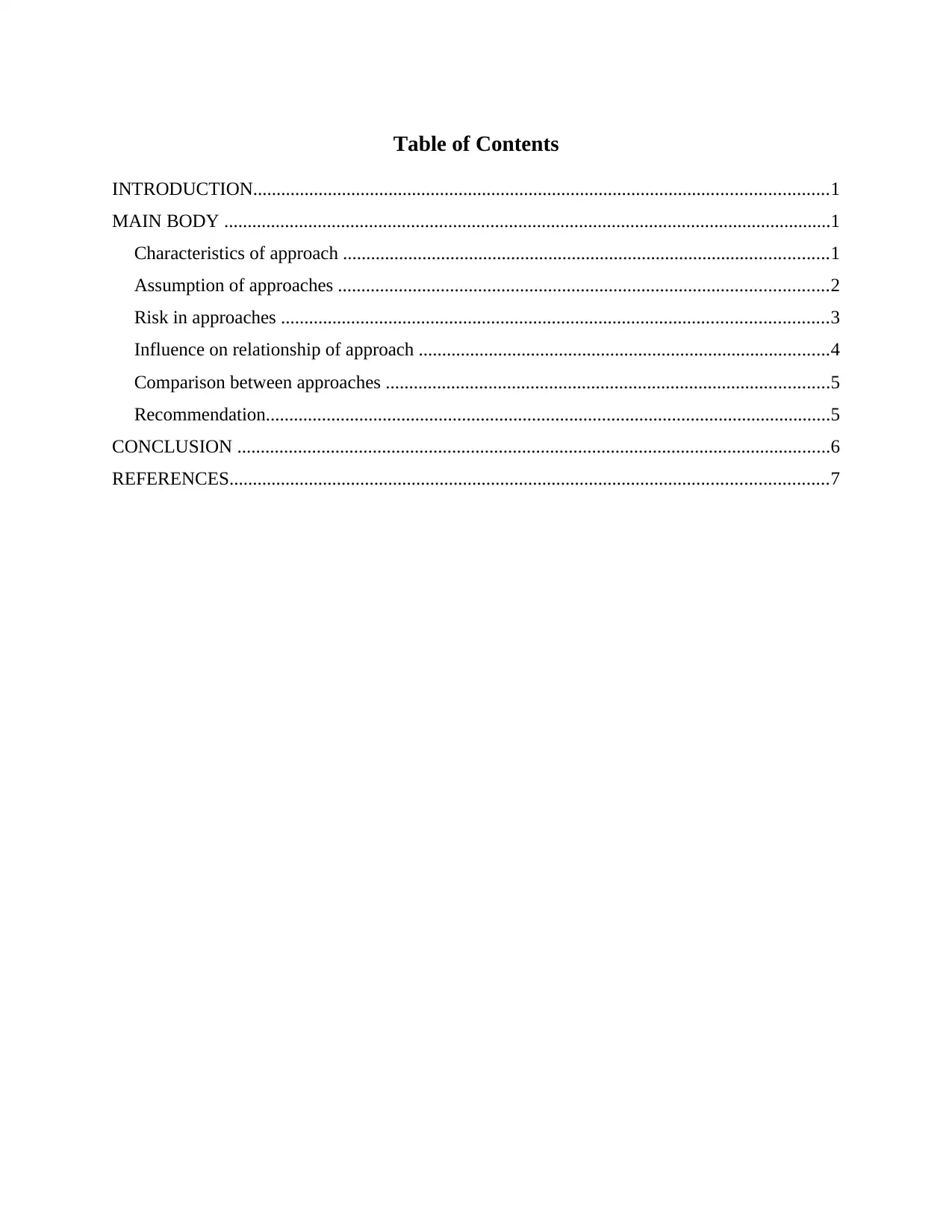
Table of Contents
INTRODUCTION...........................................................................................................................1
MAIN BODY ..................................................................................................................................1
Characteristics of approach ........................................................................................................1
Assumption of approaches .........................................................................................................2
Risk in approaches .....................................................................................................................3
Influence on relationship of approach ........................................................................................4
Comparison between approaches ...............................................................................................5
Recommendation.........................................................................................................................5
CONCLUSION ...............................................................................................................................6
REFERENCES................................................................................................................................7
INTRODUCTION...........................................................................................................................1
MAIN BODY ..................................................................................................................................1
Characteristics of approach ........................................................................................................1
Assumption of approaches .........................................................................................................2
Risk in approaches .....................................................................................................................3
Influence on relationship of approach ........................................................................................4
Comparison between approaches ...............................................................................................5
Recommendation.........................................................................................................................5
CONCLUSION ...............................................................................................................................6
REFERENCES................................................................................................................................7
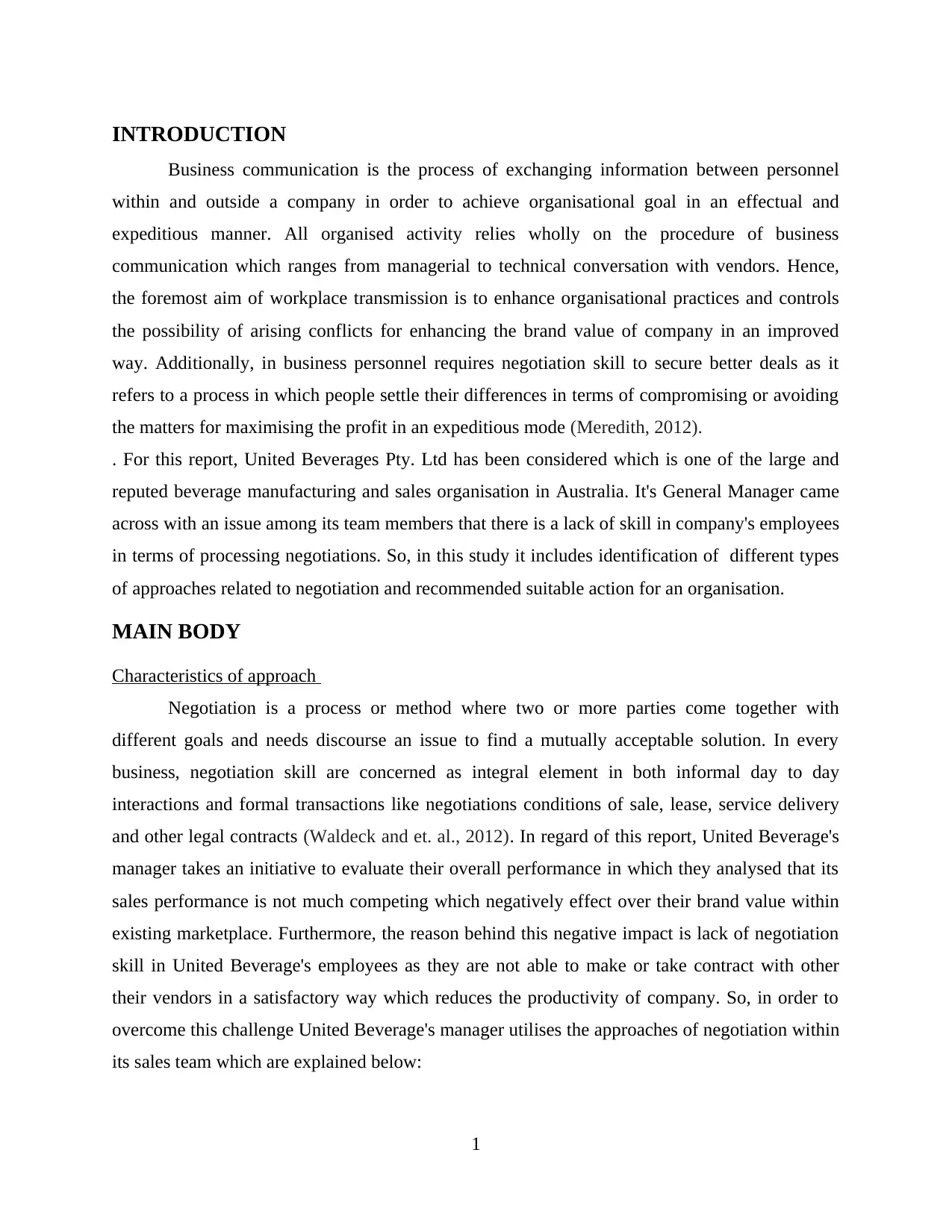
INTRODUCTION
Business communication is the process of exchanging information between personnel
within and outside a company in order to achieve organisational goal in an effectual and
expeditious manner. All organised activity relies wholly on the procedure of business
communication which ranges from managerial to technical conversation with vendors. Hence,
the foremost aim of workplace transmission is to enhance organisational practices and controls
the possibility of arising conflicts for enhancing the brand value of company in an improved
way. Additionally, in business personnel requires negotiation skill to secure better deals as it
refers to a process in which people settle their differences in terms of compromising or avoiding
the matters for maximising the profit in an expeditious mode (Meredith, 2012).
. For this report, United Beverages Pty. Ltd has been considered which is one of the large and
reputed beverage manufacturing and sales organisation in Australia. It's General Manager came
across with an issue among its team members that there is a lack of skill in company's employees
in terms of processing negotiations. So, in this study it includes identification of different types
of approaches related to negotiation and recommended suitable action for an organisation.
MAIN BODY
Characteristics of approach
Negotiation is a process or method where two or more parties come together with
different goals and needs discourse an issue to find a mutually acceptable solution. In every
business, negotiation skill are concerned as integral element in both informal day to day
interactions and formal transactions like negotiations conditions of sale, lease, service delivery
and other legal contracts (Waldeck and et. al., 2012). In regard of this report, United Beverage's
manager takes an initiative to evaluate their overall performance in which they analysed that its
sales performance is not much competing which negatively effect over their brand value within
existing marketplace. Furthermore, the reason behind this negative impact is lack of negotiation
skill in United Beverage's employees as they are not able to make or take contract with other
their vendors in a satisfactory way which reduces the productivity of company. So, in order to
overcome this challenge United Beverage's manager utilises the approaches of negotiation within
its sales team which are explained below:
1
Business communication is the process of exchanging information between personnel
within and outside a company in order to achieve organisational goal in an effectual and
expeditious manner. All organised activity relies wholly on the procedure of business
communication which ranges from managerial to technical conversation with vendors. Hence,
the foremost aim of workplace transmission is to enhance organisational practices and controls
the possibility of arising conflicts for enhancing the brand value of company in an improved
way. Additionally, in business personnel requires negotiation skill to secure better deals as it
refers to a process in which people settle their differences in terms of compromising or avoiding
the matters for maximising the profit in an expeditious mode (Meredith, 2012).
. For this report, United Beverages Pty. Ltd has been considered which is one of the large and
reputed beverage manufacturing and sales organisation in Australia. It's General Manager came
across with an issue among its team members that there is a lack of skill in company's employees
in terms of processing negotiations. So, in this study it includes identification of different types
of approaches related to negotiation and recommended suitable action for an organisation.
MAIN BODY
Characteristics of approach
Negotiation is a process or method where two or more parties come together with
different goals and needs discourse an issue to find a mutually acceptable solution. In every
business, negotiation skill are concerned as integral element in both informal day to day
interactions and formal transactions like negotiations conditions of sale, lease, service delivery
and other legal contracts (Waldeck and et. al., 2012). In regard of this report, United Beverage's
manager takes an initiative to evaluate their overall performance in which they analysed that its
sales performance is not much competing which negatively effect over their brand value within
existing marketplace. Furthermore, the reason behind this negative impact is lack of negotiation
skill in United Beverage's employees as they are not able to make or take contract with other
their vendors in a satisfactory way which reduces the productivity of company. So, in order to
overcome this challenge United Beverage's manager utilises the approaches of negotiation within
its sales team which are explained below:
1
⊘ This is a preview!⊘
Do you want full access?
Subscribe today to unlock all pages.

Trusted by 1+ million students worldwide
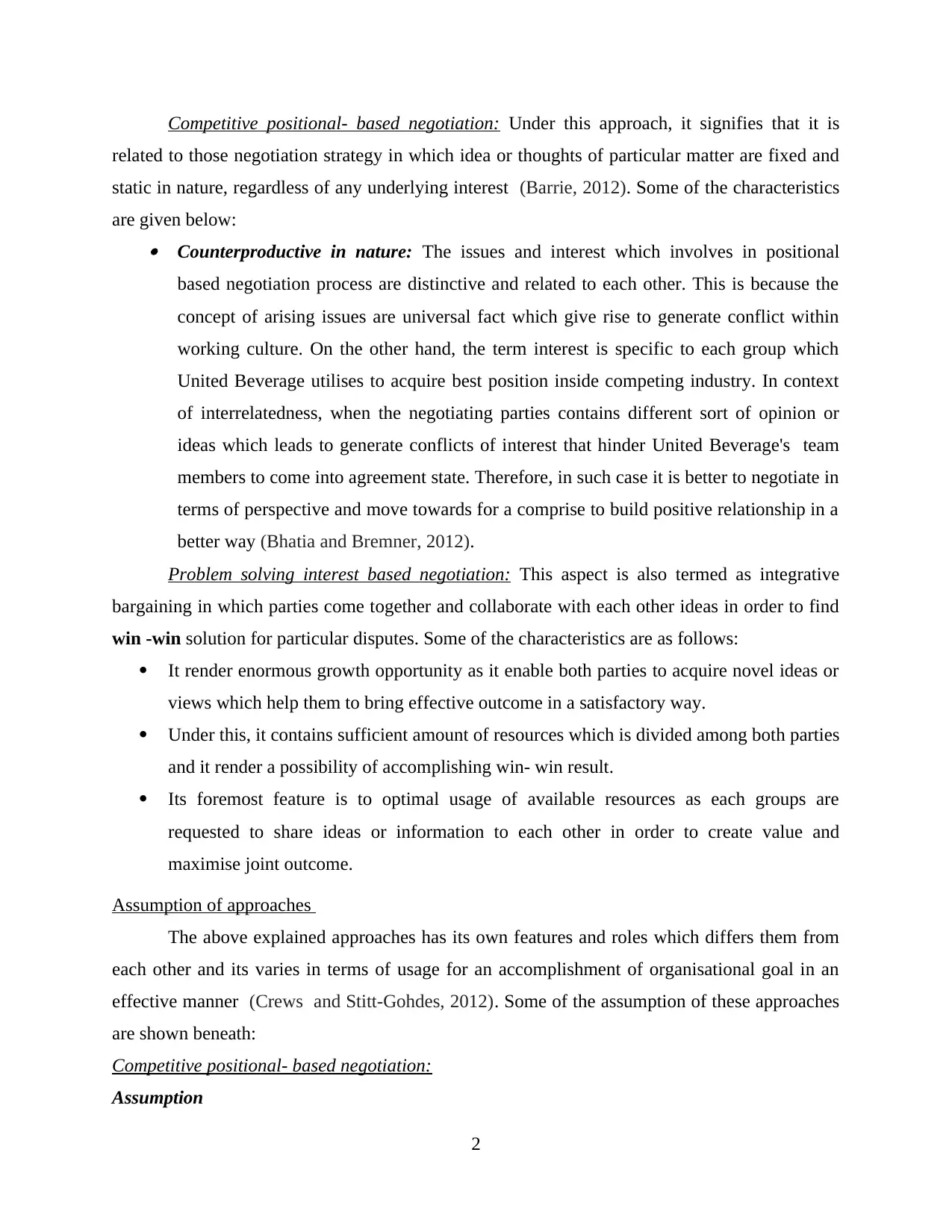
Competitive positional- based negotiation: Under this approach, it signifies that it is
related to those negotiation strategy in which idea or thoughts of particular matter are fixed and
static in nature, regardless of any underlying interest (Barrie, 2012). Some of the characteristics
are given below: Counterproductive in nature: The issues and interest which involves in positional
based negotiation process are distinctive and related to each other. This is because the
concept of arising issues are universal fact which give rise to generate conflict within
working culture. On the other hand, the term interest is specific to each group which
United Beverage utilises to acquire best position inside competing industry. In context
of interrelatedness, when the negotiating parties contains different sort of opinion or
ideas which leads to generate conflicts of interest that hinder United Beverage's team
members to come into agreement state. Therefore, in such case it is better to negotiate in
terms of perspective and move towards for a comprise to build positive relationship in a
better way (Bhatia and Bremner, 2012).
Problem solving interest based negotiation: This aspect is also termed as integrative
bargaining in which parties come together and collaborate with each other ideas in order to find
win -win solution for particular disputes. Some of the characteristics are as follows:
It render enormous growth opportunity as it enable both parties to acquire novel ideas or
views which help them to bring effective outcome in a satisfactory way.
Under this, it contains sufficient amount of resources which is divided among both parties
and it render a possibility of accomplishing win- win result.
Its foremost feature is to optimal usage of available resources as each groups are
requested to share ideas or information to each other in order to create value and
maximise joint outcome.
Assumption of approaches
The above explained approaches has its own features and roles which differs them from
each other and its varies in terms of usage for an accomplishment of organisational goal in an
effective manner (Crews and Stitt-Gohdes, 2012). Some of the assumption of these approaches
are shown beneath:
Competitive positional- based negotiation:
Assumption
2
related to those negotiation strategy in which idea or thoughts of particular matter are fixed and
static in nature, regardless of any underlying interest (Barrie, 2012). Some of the characteristics
are given below: Counterproductive in nature: The issues and interest which involves in positional
based negotiation process are distinctive and related to each other. This is because the
concept of arising issues are universal fact which give rise to generate conflict within
working culture. On the other hand, the term interest is specific to each group which
United Beverage utilises to acquire best position inside competing industry. In context
of interrelatedness, when the negotiating parties contains different sort of opinion or
ideas which leads to generate conflicts of interest that hinder United Beverage's team
members to come into agreement state. Therefore, in such case it is better to negotiate in
terms of perspective and move towards for a comprise to build positive relationship in a
better way (Bhatia and Bremner, 2012).
Problem solving interest based negotiation: This aspect is also termed as integrative
bargaining in which parties come together and collaborate with each other ideas in order to find
win -win solution for particular disputes. Some of the characteristics are as follows:
It render enormous growth opportunity as it enable both parties to acquire novel ideas or
views which help them to bring effective outcome in a satisfactory way.
Under this, it contains sufficient amount of resources which is divided among both parties
and it render a possibility of accomplishing win- win result.
Its foremost feature is to optimal usage of available resources as each groups are
requested to share ideas or information to each other in order to create value and
maximise joint outcome.
Assumption of approaches
The above explained approaches has its own features and roles which differs them from
each other and its varies in terms of usage for an accomplishment of organisational goal in an
effective manner (Crews and Stitt-Gohdes, 2012). Some of the assumption of these approaches
are shown beneath:
Competitive positional- based negotiation:
Assumption
2
Paraphrase This Document
Need a fresh take? Get an instant paraphrase of this document with our AI Paraphraser
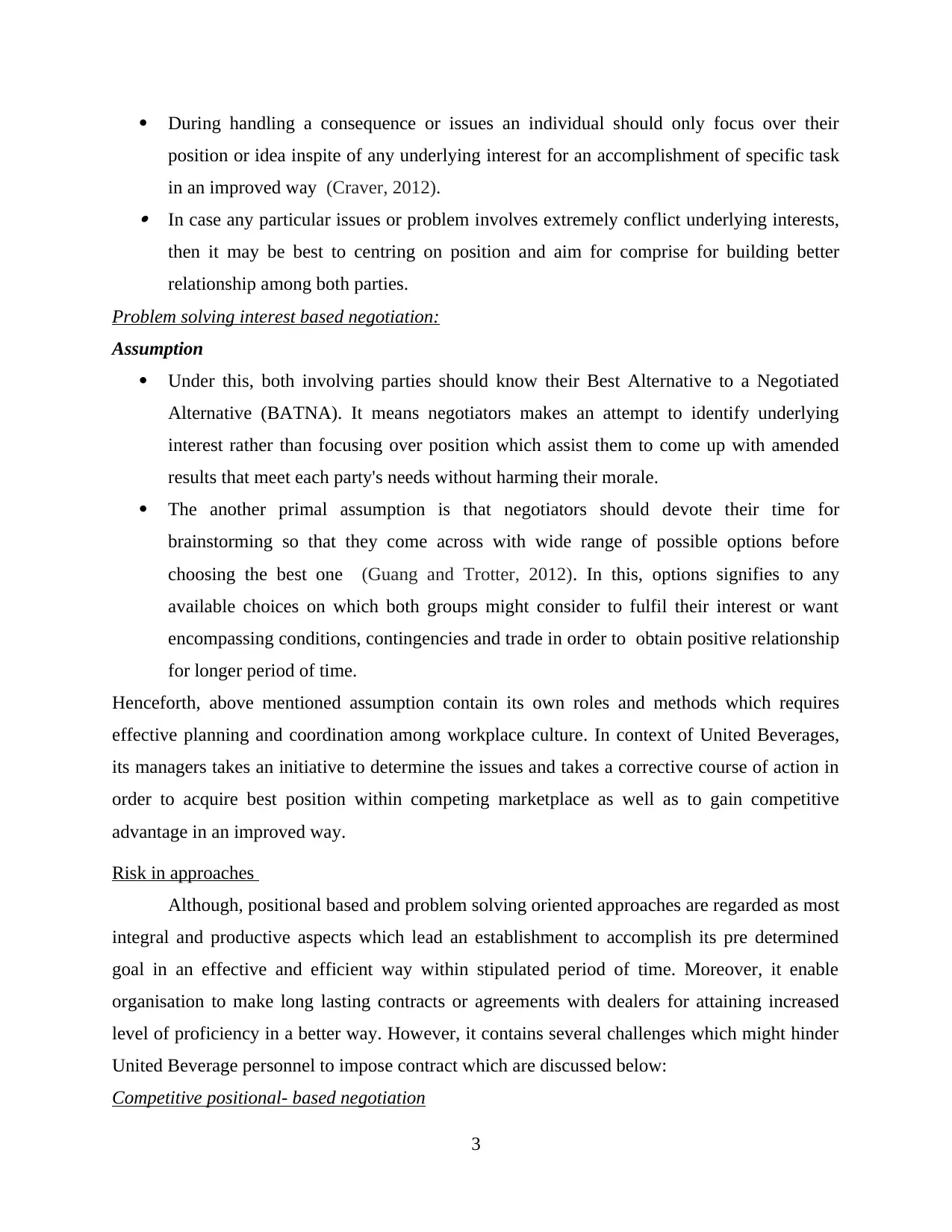
During handling a consequence or issues an individual should only focus over their
position or idea inspite of any underlying interest for an accomplishment of specific task
in an improved way (Craver, 2012). In case any particular issues or problem involves extremely conflict underlying interests,
then it may be best to centring on position and aim for comprise for building better
relationship among both parties.
Problem solving interest based negotiation:
Assumption
Under this, both involving parties should know their Best Alternative to a Negotiated
Alternative (BATNA). It means negotiators makes an attempt to identify underlying
interest rather than focusing over position which assist them to come up with amended
results that meet each party's needs without harming their morale.
The another primal assumption is that negotiators should devote their time for
brainstorming so that they come across with wide range of possible options before
choosing the best one (Guang and Trotter, 2012). In this, options signifies to any
available choices on which both groups might consider to fulfil their interest or want
encompassing conditions, contingencies and trade in order to obtain positive relationship
for longer period of time.
Henceforth, above mentioned assumption contain its own roles and methods which requires
effective planning and coordination among workplace culture. In context of United Beverages,
its managers takes an initiative to determine the issues and takes a corrective course of action in
order to acquire best position within competing marketplace as well as to gain competitive
advantage in an improved way.
Risk in approaches
Although, positional based and problem solving oriented approaches are regarded as most
integral and productive aspects which lead an establishment to accomplish its pre determined
goal in an effective and efficient way within stipulated period of time. Moreover, it enable
organisation to make long lasting contracts or agreements with dealers for attaining increased
level of proficiency in a better way. However, it contains several challenges which might hinder
United Beverage personnel to impose contract which are discussed below:
Competitive positional- based negotiation
3
position or idea inspite of any underlying interest for an accomplishment of specific task
in an improved way (Craver, 2012). In case any particular issues or problem involves extremely conflict underlying interests,
then it may be best to centring on position and aim for comprise for building better
relationship among both parties.
Problem solving interest based negotiation:
Assumption
Under this, both involving parties should know their Best Alternative to a Negotiated
Alternative (BATNA). It means negotiators makes an attempt to identify underlying
interest rather than focusing over position which assist them to come up with amended
results that meet each party's needs without harming their morale.
The another primal assumption is that negotiators should devote their time for
brainstorming so that they come across with wide range of possible options before
choosing the best one (Guang and Trotter, 2012). In this, options signifies to any
available choices on which both groups might consider to fulfil their interest or want
encompassing conditions, contingencies and trade in order to obtain positive relationship
for longer period of time.
Henceforth, above mentioned assumption contain its own roles and methods which requires
effective planning and coordination among workplace culture. In context of United Beverages,
its managers takes an initiative to determine the issues and takes a corrective course of action in
order to acquire best position within competing marketplace as well as to gain competitive
advantage in an improved way.
Risk in approaches
Although, positional based and problem solving oriented approaches are regarded as most
integral and productive aspects which lead an establishment to accomplish its pre determined
goal in an effective and efficient way within stipulated period of time. Moreover, it enable
organisation to make long lasting contracts or agreements with dealers for attaining increased
level of proficiency in a better way. However, it contains several challenges which might hinder
United Beverage personnel to impose contract which are discussed below:
Competitive positional- based negotiation
3
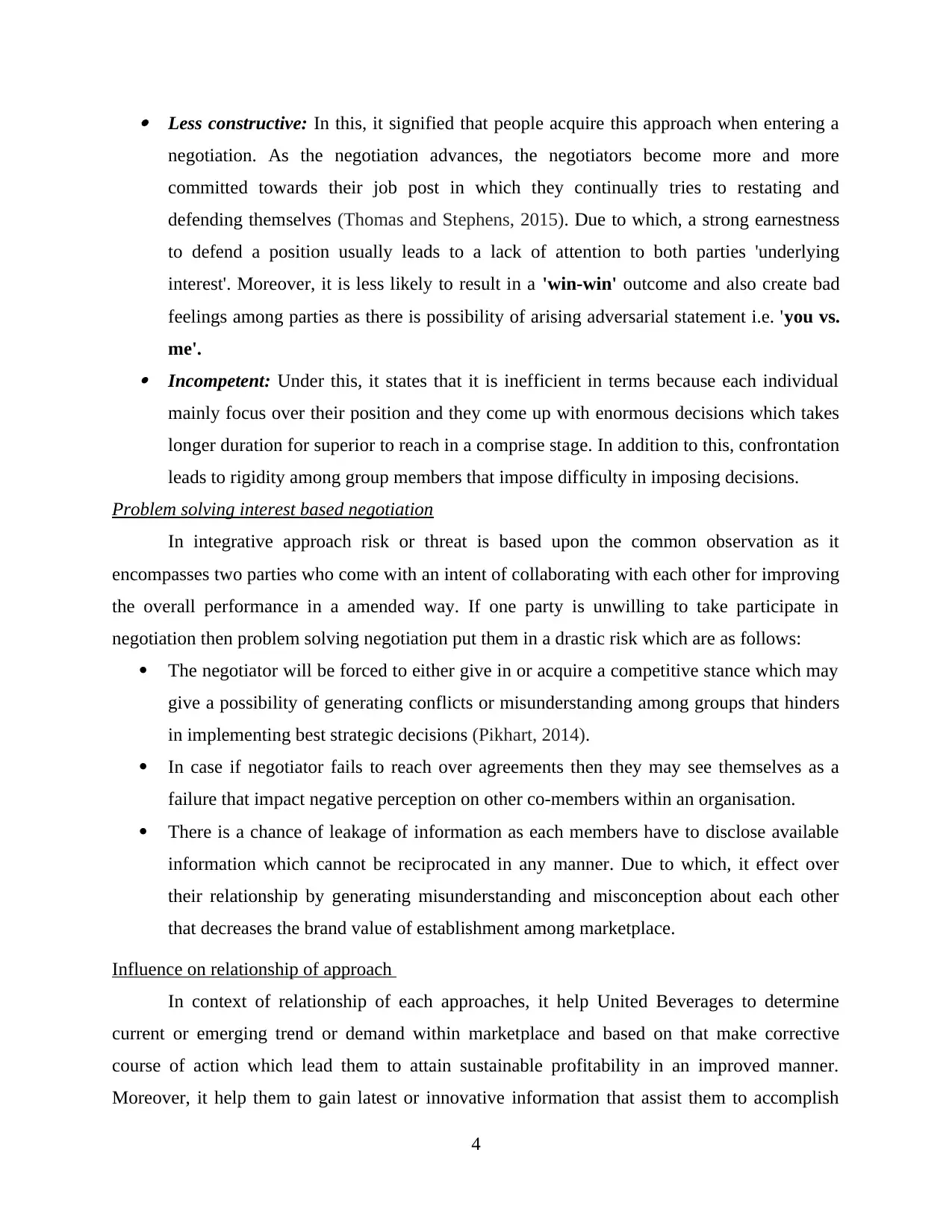
Less constructive: In this, it signified that people acquire this approach when entering a
negotiation. As the negotiation advances, the negotiators become more and more
committed towards their job post in which they continually tries to restating and
defending themselves (Thomas and Stephens, 2015). Due to which, a strong earnestness
to defend a position usually leads to a lack of attention to both parties 'underlying
interest'. Moreover, it is less likely to result in a 'win-win' outcome and also create bad
feelings among parties as there is possibility of arising adversarial statement i.e. 'you vs.
me'. Incompetent: Under this, it states that it is inefficient in terms because each individual
mainly focus over their position and they come up with enormous decisions which takes
longer duration for superior to reach in a comprise stage. In addition to this, confrontation
leads to rigidity among group members that impose difficulty in imposing decisions.
Problem solving interest based negotiation
In integrative approach risk or threat is based upon the common observation as it
encompasses two parties who come with an intent of collaborating with each other for improving
the overall performance in a amended way. If one party is unwilling to take participate in
negotiation then problem solving negotiation put them in a drastic risk which are as follows:
The negotiator will be forced to either give in or acquire a competitive stance which may
give a possibility of generating conflicts or misunderstanding among groups that hinders
in implementing best strategic decisions (Pikhart, 2014).
In case if negotiator fails to reach over agreements then they may see themselves as a
failure that impact negative perception on other co-members within an organisation.
There is a chance of leakage of information as each members have to disclose available
information which cannot be reciprocated in any manner. Due to which, it effect over
their relationship by generating misunderstanding and misconception about each other
that decreases the brand value of establishment among marketplace.
Influence on relationship of approach
In context of relationship of each approaches, it help United Beverages to determine
current or emerging trend or demand within marketplace and based on that make corrective
course of action which lead them to attain sustainable profitability in an improved manner.
Moreover, it help them to gain latest or innovative information that assist them to accomplish
4
negotiation. As the negotiation advances, the negotiators become more and more
committed towards their job post in which they continually tries to restating and
defending themselves (Thomas and Stephens, 2015). Due to which, a strong earnestness
to defend a position usually leads to a lack of attention to both parties 'underlying
interest'. Moreover, it is less likely to result in a 'win-win' outcome and also create bad
feelings among parties as there is possibility of arising adversarial statement i.e. 'you vs.
me'. Incompetent: Under this, it states that it is inefficient in terms because each individual
mainly focus over their position and they come up with enormous decisions which takes
longer duration for superior to reach in a comprise stage. In addition to this, confrontation
leads to rigidity among group members that impose difficulty in imposing decisions.
Problem solving interest based negotiation
In integrative approach risk or threat is based upon the common observation as it
encompasses two parties who come with an intent of collaborating with each other for improving
the overall performance in a amended way. If one party is unwilling to take participate in
negotiation then problem solving negotiation put them in a drastic risk which are as follows:
The negotiator will be forced to either give in or acquire a competitive stance which may
give a possibility of generating conflicts or misunderstanding among groups that hinders
in implementing best strategic decisions (Pikhart, 2014).
In case if negotiator fails to reach over agreements then they may see themselves as a
failure that impact negative perception on other co-members within an organisation.
There is a chance of leakage of information as each members have to disclose available
information which cannot be reciprocated in any manner. Due to which, it effect over
their relationship by generating misunderstanding and misconception about each other
that decreases the brand value of establishment among marketplace.
Influence on relationship of approach
In context of relationship of each approaches, it help United Beverages to determine
current or emerging trend or demand within marketplace and based on that make corrective
course of action which lead them to attain sustainable profitability in an improved manner.
Moreover, it help them to gain latest or innovative information that assist them to accomplish
4
⊘ This is a preview!⊘
Do you want full access?
Subscribe today to unlock all pages.

Trusted by 1+ million students worldwide
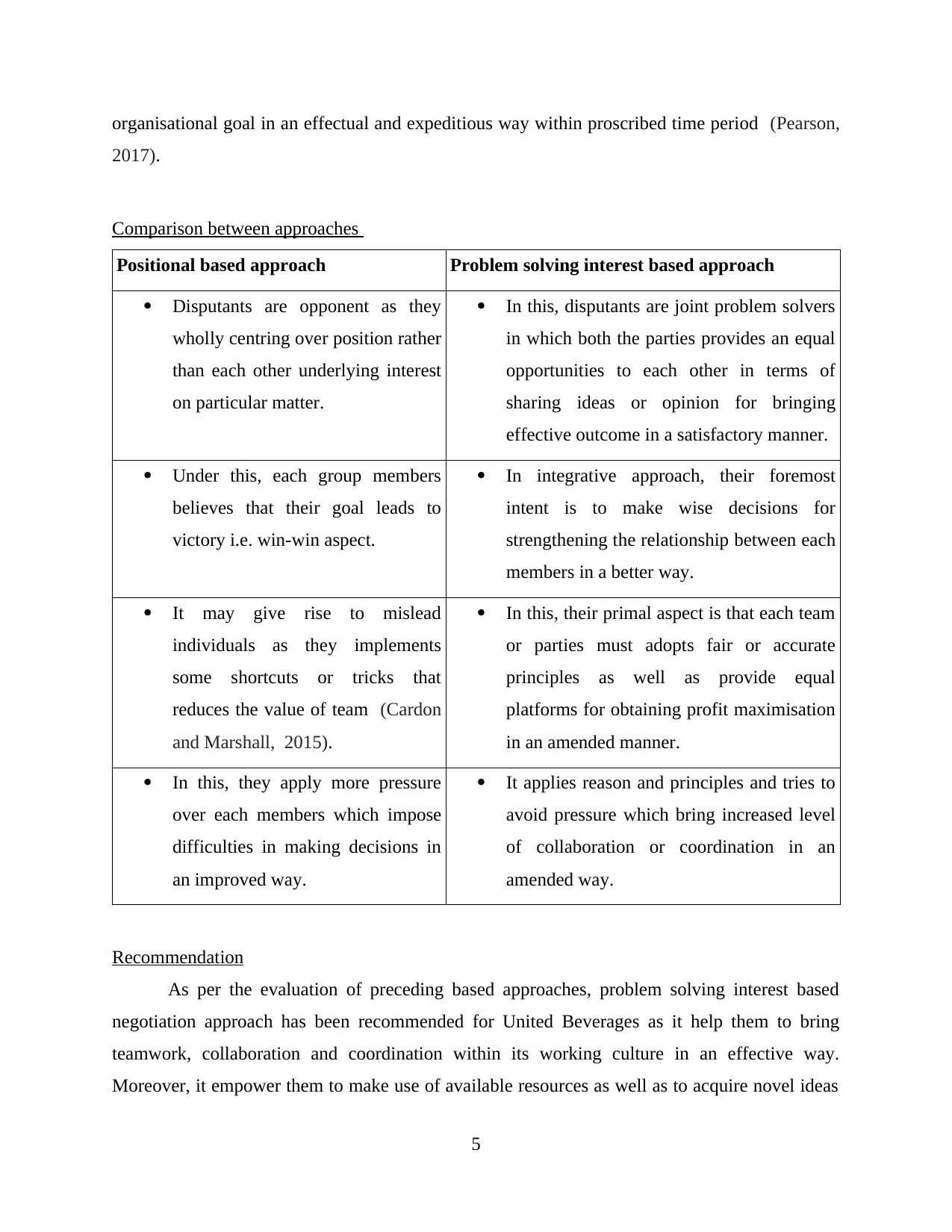
organisational goal in an effectual and expeditious way within proscribed time period (Pearson,
2017).
Comparison between approaches
Positional based approach Problem solving interest based approach
Disputants are opponent as they
wholly centring over position rather
than each other underlying interest
on particular matter.
In this, disputants are joint problem solvers
in which both the parties provides an equal
opportunities to each other in terms of
sharing ideas or opinion for bringing
effective outcome in a satisfactory manner.
Under this, each group members
believes that their goal leads to
victory i.e. win-win aspect.
In integrative approach, their foremost
intent is to make wise decisions for
strengthening the relationship between each
members in a better way.
It may give rise to mislead
individuals as they implements
some shortcuts or tricks that
reduces the value of team (Cardon
and Marshall, 2015).
In this, their primal aspect is that each team
or parties must adopts fair or accurate
principles as well as provide equal
platforms for obtaining profit maximisation
in an amended manner.
In this, they apply more pressure
over each members which impose
difficulties in making decisions in
an improved way.
It applies reason and principles and tries to
avoid pressure which bring increased level
of collaboration or coordination in an
amended way.
Recommendation
As per the evaluation of preceding based approaches, problem solving interest based
negotiation approach has been recommended for United Beverages as it help them to bring
teamwork, collaboration and coordination within its working culture in an effective way.
Moreover, it empower them to make use of available resources as well as to acquire novel ideas
5
2017).
Comparison between approaches
Positional based approach Problem solving interest based approach
Disputants are opponent as they
wholly centring over position rather
than each other underlying interest
on particular matter.
In this, disputants are joint problem solvers
in which both the parties provides an equal
opportunities to each other in terms of
sharing ideas or opinion for bringing
effective outcome in a satisfactory manner.
Under this, each group members
believes that their goal leads to
victory i.e. win-win aspect.
In integrative approach, their foremost
intent is to make wise decisions for
strengthening the relationship between each
members in a better way.
It may give rise to mislead
individuals as they implements
some shortcuts or tricks that
reduces the value of team (Cardon
and Marshall, 2015).
In this, their primal aspect is that each team
or parties must adopts fair or accurate
principles as well as provide equal
platforms for obtaining profit maximisation
in an amended manner.
In this, they apply more pressure
over each members which impose
difficulties in making decisions in
an improved way.
It applies reason and principles and tries to
avoid pressure which bring increased level
of collaboration or coordination in an
amended way.
Recommendation
As per the evaluation of preceding based approaches, problem solving interest based
negotiation approach has been recommended for United Beverages as it help them to bring
teamwork, collaboration and coordination within its working culture in an effective way.
Moreover, it empower them to make use of available resources as well as to acquire novel ideas
5
Paraphrase This Document
Need a fresh take? Get an instant paraphrase of this document with our AI Paraphraser
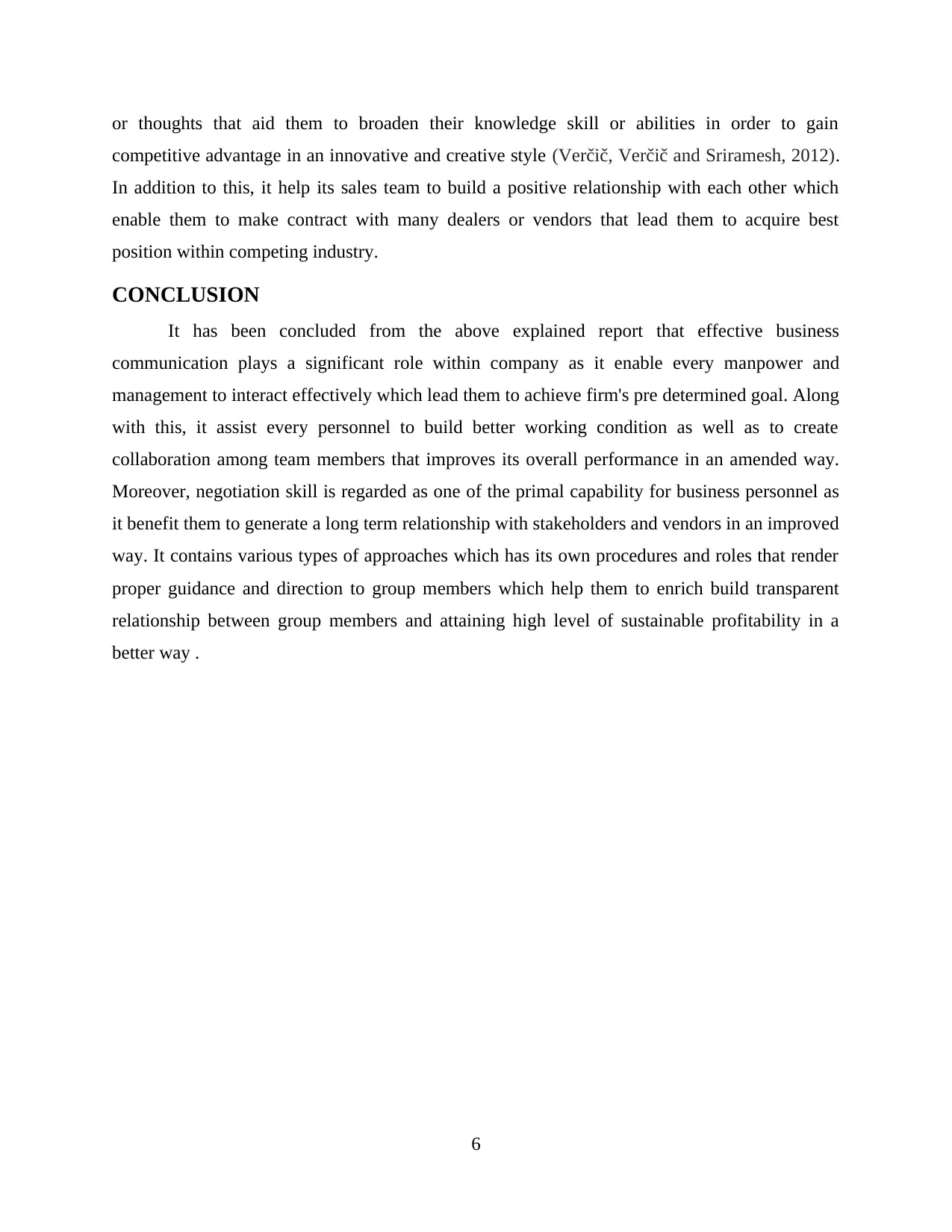
or thoughts that aid them to broaden their knowledge skill or abilities in order to gain
competitive advantage in an innovative and creative style (Verčič, Verčič and Sriramesh, 2012).
In addition to this, it help its sales team to build a positive relationship with each other which
enable them to make contract with many dealers or vendors that lead them to acquire best
position within competing industry.
CONCLUSION
It has been concluded from the above explained report that effective business
communication plays a significant role within company as it enable every manpower and
management to interact effectively which lead them to achieve firm's pre determined goal. Along
with this, it assist every personnel to build better working condition as well as to create
collaboration among team members that improves its overall performance in an amended way.
Moreover, negotiation skill is regarded as one of the primal capability for business personnel as
it benefit them to generate a long term relationship with stakeholders and vendors in an improved
way. It contains various types of approaches which has its own procedures and roles that render
proper guidance and direction to group members which help them to enrich build transparent
relationship between group members and attaining high level of sustainable profitability in a
better way .
6
competitive advantage in an innovative and creative style (Verčič, Verčič and Sriramesh, 2012).
In addition to this, it help its sales team to build a positive relationship with each other which
enable them to make contract with many dealers or vendors that lead them to acquire best
position within competing industry.
CONCLUSION
It has been concluded from the above explained report that effective business
communication plays a significant role within company as it enable every manpower and
management to interact effectively which lead them to achieve firm's pre determined goal. Along
with this, it assist every personnel to build better working condition as well as to create
collaboration among team members that improves its overall performance in an amended way.
Moreover, negotiation skill is regarded as one of the primal capability for business personnel as
it benefit them to generate a long term relationship with stakeholders and vendors in an improved
way. It contains various types of approaches which has its own procedures and roles that render
proper guidance and direction to group members which help them to enrich build transparent
relationship between group members and attaining high level of sustainable profitability in a
better way .
6
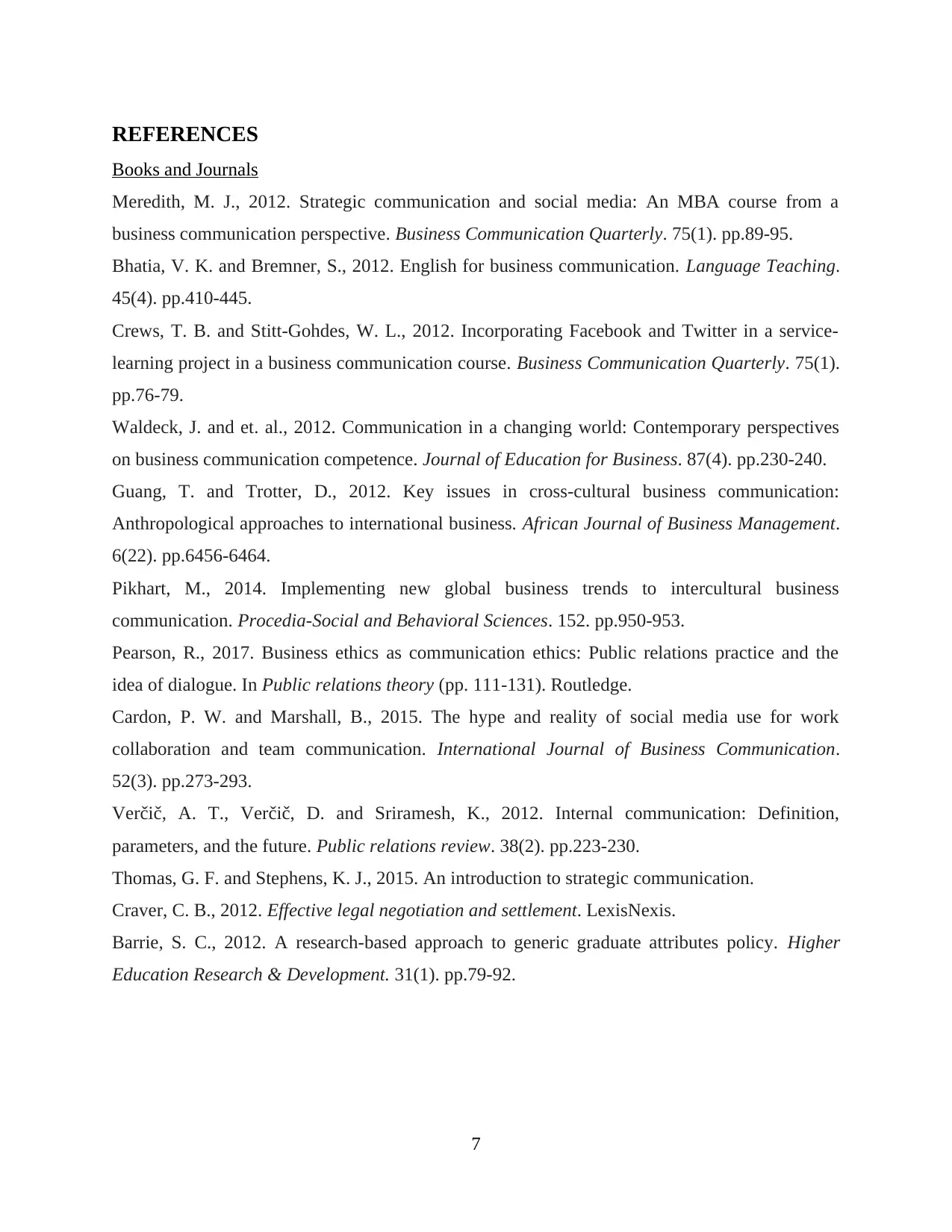
REFERENCES
Books and Journals
Meredith, M. J., 2012. Strategic communication and social media: An MBA course from a
business communication perspective. Business Communication Quarterly. 75(1). pp.89-95.
Bhatia, V. K. and Bremner, S., 2012. English for business communication. Language Teaching.
45(4). pp.410-445.
Crews, T. B. and Stitt-Gohdes, W. L., 2012. Incorporating Facebook and Twitter in a service-
learning project in a business communication course. Business Communication Quarterly. 75(1).
pp.76-79.
Waldeck, J. and et. al., 2012. Communication in a changing world: Contemporary perspectives
on business communication competence. Journal of Education for Business. 87(4). pp.230-240.
Guang, T. and Trotter, D., 2012. Key issues in cross-cultural business communication:
Anthropological approaches to international business. African Journal of Business Management.
6(22). pp.6456-6464.
Pikhart, M., 2014. Implementing new global business trends to intercultural business
communication. Procedia-Social and Behavioral Sciences. 152. pp.950-953.
Pearson, R., 2017. Business ethics as communication ethics: Public relations practice and the
idea of dialogue. In Public relations theory (pp. 111-131). Routledge.
Cardon, P. W. and Marshall, B., 2015. The hype and reality of social media use for work
collaboration and team communication. International Journal of Business Communication.
52(3). pp.273-293.
Verčič, A. T., Verčič, D. and Sriramesh, K., 2012. Internal communication: Definition,
parameters, and the future. Public relations review. 38(2). pp.223-230.
Thomas, G. F. and Stephens, K. J., 2015. An introduction to strategic communication.
Craver, C. B., 2012. Effective legal negotiation and settlement. LexisNexis.
Barrie, S. C., 2012. A research-based approach to generic graduate attributes policy. Higher
Education Research & Development. 31(1). pp.79-92.
7
Books and Journals
Meredith, M. J., 2012. Strategic communication and social media: An MBA course from a
business communication perspective. Business Communication Quarterly. 75(1). pp.89-95.
Bhatia, V. K. and Bremner, S., 2012. English for business communication. Language Teaching.
45(4). pp.410-445.
Crews, T. B. and Stitt-Gohdes, W. L., 2012. Incorporating Facebook and Twitter in a service-
learning project in a business communication course. Business Communication Quarterly. 75(1).
pp.76-79.
Waldeck, J. and et. al., 2012. Communication in a changing world: Contemporary perspectives
on business communication competence. Journal of Education for Business. 87(4). pp.230-240.
Guang, T. and Trotter, D., 2012. Key issues in cross-cultural business communication:
Anthropological approaches to international business. African Journal of Business Management.
6(22). pp.6456-6464.
Pikhart, M., 2014. Implementing new global business trends to intercultural business
communication. Procedia-Social and Behavioral Sciences. 152. pp.950-953.
Pearson, R., 2017. Business ethics as communication ethics: Public relations practice and the
idea of dialogue. In Public relations theory (pp. 111-131). Routledge.
Cardon, P. W. and Marshall, B., 2015. The hype and reality of social media use for work
collaboration and team communication. International Journal of Business Communication.
52(3). pp.273-293.
Verčič, A. T., Verčič, D. and Sriramesh, K., 2012. Internal communication: Definition,
parameters, and the future. Public relations review. 38(2). pp.223-230.
Thomas, G. F. and Stephens, K. J., 2015. An introduction to strategic communication.
Craver, C. B., 2012. Effective legal negotiation and settlement. LexisNexis.
Barrie, S. C., 2012. A research-based approach to generic graduate attributes policy. Higher
Education Research & Development. 31(1). pp.79-92.
7
⊘ This is a preview!⊘
Do you want full access?
Subscribe today to unlock all pages.

Trusted by 1+ million students worldwide
1 out of 9
Related Documents
Your All-in-One AI-Powered Toolkit for Academic Success.
+13062052269
info@desklib.com
Available 24*7 on WhatsApp / Email
![[object Object]](/_next/static/media/star-bottom.7253800d.svg)
Unlock your academic potential
Copyright © 2020–2026 A2Z Services. All Rights Reserved. Developed and managed by ZUCOL.





